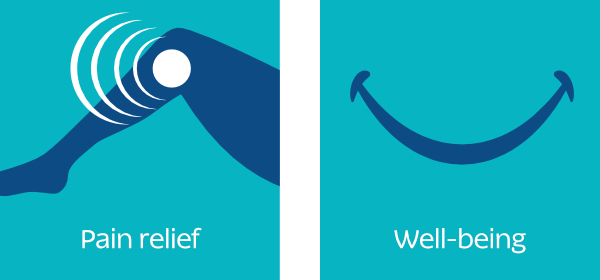In my clinical advisory role for Wealden Rehab, I was asked for my professional opinion on the benefits of showering in a recent piece of work.
I felt passionate about sharing my knowledge on this topic with the team especially because a core skill of OT is having the ability to assess and analyse barriers affecting independence in personal care tasks and understanding of the whole person's needs, due to our dual training in physical and mental health.
It felt important to convey that showering, for most people, is a daily task we often take for granted that kick-starts the day, frequently enhancing motivation and productivity.
OTs recognize the importance of routine and how limited access to care support, appropriate equipment or environments to engage in daily routines, is often detrimental to an individual’s psycho-social and physical needs.

The psychosocial benefits of showering
For many clients taking pride in their appearance and hygiene is integral in self-expression, which inherently can have an impact on self-confidence and whether they feel socially accepted.
Previously working in an adult physical disability team, I will always remember one client who presented with symptoms of depression, loneliness, reduced roles and routines, due to her paranoia of body odour as a result of not having access to a shower. A simple recommendation of a wet floor shower and appropriate seat not only addressed her physical needs, but psychosocial needs also.
Working in a mental health setting in the early stages of my career, raised my awareness of service users with depressive and psychotic diagnoses and how this affected service users’ ability to attend to personal hygiene needs.
Birken et al. (2021) took part in a study focussing on how self-care can often be neglected amongst people with mental health issues. They investigate the reasons behind this and explore various methods that can be taken to ensure self-care, (such as showering/bathing) is not neglected due to mental health problems. It was summarised that self-care can have a positive impact on mental health as it increases motivation, improves concentration, reduces stress and anxiety and increases management of fatigue.
We all recognise the importance of time for oneself and how a little bit of pampering makes us feel good and can lift our spirits. Also, after a stressful day having a shower or a bath has a positive impact on stress, sleep and general wellbeing.
One study summarises that showering positively impacts stress, by spiking oxytocin levels which help to wind down the fight-flight response behind daily stress (Uvnäs-Moberg, 1997). This study concludes the benefits of showering are linked with the act itself, not the eventual effect on our daily routine.
The physical benefits of showering
Having access to running water to keep clean, removes bacteria from the skin that causes body odour and reduces the likelihood of skin infection. Nursing colleagues over the years have strongly supported my OT recommendations regarding the physical benefits of showering, especially for individuals with urinary and bowel conditions. Good hygiene practice prevents and manages certain conditions; but we also know it limits further deterioration of the skin for example acquiring a pressure sore if the skin is not kept clean.
As an OT I recognise that pain and wellbeing are closely connected, and I have worked with numerous people over the years who have experienced a reduction in their mood because of pain. Many clients use the water pressure and heat from showering to manage tension, joint pain, stiffness and muscles spasms.
Water is known to have physiological benefits of widening the blood vessel, which increases blood flow transporting lactic acid away from tired muscles by stimulating circulation.
Goto et al. (2018: 4) conducted a study on the benefits of bathing. Their study concludes that bathing ‘induces venous flow, thereby increasing cardiac output and improving metabolism’. This reflects a positive physical impact, as the warm water soothes the body. However, the authors also discuss the psychological effects including: ‘stress relief, refreshment, and relaxation from immersion bathing’. Again, this concludes that the act of keeping clean can benefit a person in many ways. Therefore, all people must have access to showering/bathing irrespective of their ability- their needs should be accounted for.
The literature reviewed emphasises a clear link between mental and physical wellbeing and supports an OTs perspective on the benefits of showering.
Gayle Cardwell Independent occupational therapist
Wealden Rehab specialises in offering innovative and effective bathing solutions, such as the RAZ Shower Chairs and Turtle Bath Support. For more information about our bathing and hygiene products, please call our friendly team on 01634 813388.
Reference List:
Birken, M., Wong, H. T., McPherson, P. and Killaspy, H., 2021. “A systematic review of the published literature on interventions to improve personal self-care for people with severe mental health problems.” British Journal of Occupational Therapy. 84(4), pp. 200-211.
Goto, Y., Hayasaka, S., Kurihara, S. and Nakamura, Y., 2018. “Physical and mental effects of bathing: a randomized intervention study.” Evidence-Based Complementary and Alternative Medicine.
Uvnäs-Moberg, K., 1997. “Oxytocin linked with antistress effects—the relaxation and growth response.” Acta physiologica Scandinavia. Supplementum. 640, pp. 38-42.

Featured products
Latest Blog Posts
Sustainable shower chairs for smarter budgets
Future-proofing care: Sustainable shower chairs for smarter budgets

Advancing safe, dignified bathing
A clinical perspective on the IndiGo² powered shower chair range

Seasonal opening times 2025/26
2025 Holiday Season Update - Our team are here for you but we will be taking a break between the 24th December and 2nd January 2025.

New Shower Chair Innovation
Experience Wealden Rehab’s new shower chair innovation at the OT Show 2025

Responsive Care Equipment Supplier Across the UK
Supporting hospitals and care providers in unsettling times ...

NAEP Conference 2025
Meeting Occupational Therapists, Commissioners and Exploring Bariatric and Paediatric Solutions



